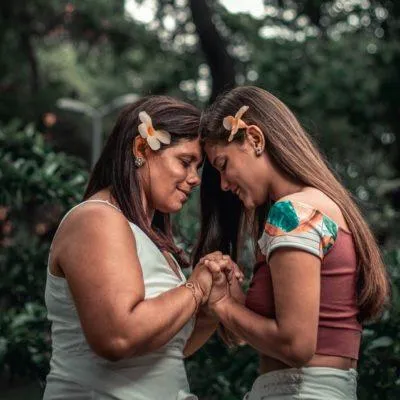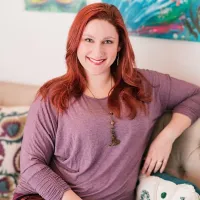

Moon Essence™ Blog
Blog

Coming of Age: Empowering the Next Generation

Menarche. This word is not as commonly used for the “coming of age” in recent years, but menarche the formal name for when a girl has her first period and makes the transition into womanhood.
This moment in a girl’s life is special. The sacredness of this life transition used to be honored with celebration and wisdom passed from generation to generation – mothers and grandmothers to daughters and granddaughters.
We have lost sight in recent generations of how important this phase of life transition is for the future of the young girl’s life. How we talk about the period affects how they feel about it. How we demonstrate self care sets a president for how they care for themselves and teach their children to care for their bodies as well.
I recently became a Sacred Menarche Mentor with the beautiful Tnah Louise because I am passionate about honoring a girl’s coming of age with ceremony and education.
Historical Narrative
I remember when my period started. I was at a school retreat in a church the next town over from our school. I was 12 and painfully shy. I had felt weird in my abdomen since I had left for school that morning, but didn’t think too much of it…until I saw the blood.
Embarrassed, my mind was swirling with “so what did my mother say to do?” as I sat on the toilet staring at the red bloom that had appeared in my underwear so unexpectedly. I had to get a pad from a teacher because the pad my mother had stuck into my backpack months prior was safely tucked into the locker at school.
We had talked about the possibility of my period coming, but it was only to the extent that I needed to keep the pad in my bag “just in case.” The book she had shared with me at the age of 9 (because my grandmother’s period started at 9) about this moment in a woman’s life was a distant memory by the time my own cycle began.
The teacher was pleasant, polite and helpful, but I remember when she handed me the pad, with a fleeting glance in both directions, instructed me to stick it in my pocket so others wouldn’t see it as I made the trek back to the bathroom.
That moment stuck with me. Why did I have to hide this pad? Weren’t other girls doing this too? I suddenly felt shame that I was bleeding and scurried off to the bathroom flush in the face to address this new issue I was dealing with.
From that day forward, I always hid the pad in my pocket. I would tuck the tampon up my sleeve and hope no one saw me scooting down the hall to the bathroom during menstruation.
This story may be mine, but it mirrors the experience of so many women that I work with.
Cultural Shame
Bleeding years bring shame, embarrassment and a lamenting that the period is happening for so many women. We have been taught it is dirty. We are taught from social narratives that it is something to dread. We have been taught PMS and pain are “normal” through social contexts.
A really sad and alarming reality is the self confidence of boys and girls remains the same until a girl starts menstruation when it starts to drop drastically.
What if we flip that script? What if we started that relationship with menstruation differently? What if we treated this transition as a beautiful thing? Menstruation used to be honored and even celebrated because it meant the ability to create life.
Can you imagine how a girl’s self esteem would change? How her viewpoint and relationship with her body would change? I know it would have for me.
Be the change you want to see
Education is one of the most important parts of life transitions – in any phase of life. The transition into womanhood is a perfect opportunity to teach about the female body and how to care for it.
I am talking about body literacy – not sex education.
Let me say that again. This is about body literacy, not sex.
THIS. This point right here is the challenge we have in our culture. Because our culture hypersexualizes the female body and objectifies them, we don’t believe we can have a conversation about one without the other.
I challenge this viewpoint.
Body literacy teaches a girl about her body. It teaches her what a period is, what it does, and what a healthy one is supposed to look like. Body literacy teaches a girl what red flags to watch out for so she can seek care if she needs it. Body literacy puts the power in her hands to keep herself healthy instead of treating symptoms after they appear which is all too common in our society.
The conversation doesn’t have to be about sex. It is about a healthy period. It’s about how your hormones travel in a 28-30 day cycles. Its understanding there are days you will feel more tired and days you will be on fire and those are all NORMAL.
I truly believe it is possible to have an entire generation of young women who do not know what cramps are. Sounds incredible, right? It is possible with education and the right tools.
Pelvic Steaming and Menstrual Health
Honoring the coming of age means giving her the information to understand her changing body instead of being ashamed of it and wonder if she’s alone with what she’s experiencing.
One of the elements of my practice I spend the most time with my clients on is basic body literacy. Women haven’t been taught how to count their cycle. They don’t know what healthy cervical mucus is supposed to look like or how to tell when they are ovulating. These are basics that are critical to a woman’s health and would be transformational to the health of the next generation if they are taught early on in life.
Self care is as much education as it is the tools for care. Pelvic steaming or vaginal steaming is an age-old practice of gentle care that helps prevent problems in the cycle before they start and re-establish harmony in the cycle once imbalances occur.
Normalizing steaming from the start integrates the practice into everyday care. Teaching this preventative measure will help her stay healthy and be in control of her fertility when she does/doesn’t decide to have children later in life. Maintaining a healthy period means the rest of her body stays healthier the rest of her life because her hormones will maintain a normal healthy routine.
What If
If I knew as a teenager what I know now…
I wouldn’t have had cystic ovaries
I wouldn’t have had debilitating cramps
I wouldn’t have had irregular cycles
I could have prevented endometriosis
I wouldn’t have gone on birth control at 15 as a means to “control” those symptoms
I wouldn’t have had that decade of birth control use end in a heart attack at age 25
I wouldn’t have chosen some of the partners I have been with because birth control changed my biochemistry
Just imagine how the health and trajectory of your daughter’s life could be changed if she had this information from the start? How would yours have been changed?
Almost every woman I work with will sit across the table (or the Zoom camera) from me and say “Oh my word! I wish I had this information when I was a teenager! My life would have been so different!”
Exactly. That’s what we want. A better life for our children.
Let’s educate our girls about the vessel they will live in for the rest of their lives. Let’s honor their transition into womanhood and make it feel special so they are proud to be a woman and don’t know the shame that we have.
Let’s change the narrative. Are you with me?
If you are interested in subscribing to see more from Moon Essence, click HERE!
